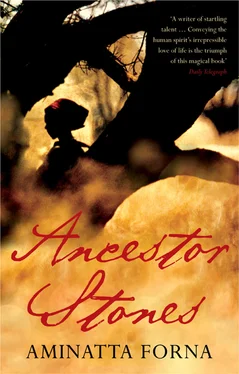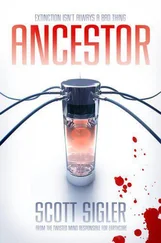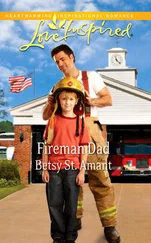The next night he brought out a board hollowed out in twelve places, six on each side, and numerous small, silver beans. He beckoned her to sit opposite him, took a handful of the beans in one hand and allowed four to drop into each hollow. Afterwards he gathered up the contents of one and began to count them out. One, two, three, four. All this was done in silence. My mother gazed at him. He jabbed his forefinger at the board. She dropped her eyes. He never spoke.
Later he stood up, placed a round felt hat upon his head and left the room. My mother was a virgin. But she had been initiated and she was a married woman. She knew enough to know this was not the way it was supposed to be, though she let on to nobody. Not even Ya Isatta who called her to one side the next morning with a crafty look on her face. That was how they often spent their nights together. Playing warri . She became very good at it.
Of course, these were things I found out later. Ya Memso was prone to those sorts of indiscretions.
It wasn’t as though nothing ever happened. My mother gave birth to me and then to my brother. But, warn? Warri is a fine game. But when was a board game ever enough for a woman?
All this was many years ago, around the time people began to build square houses. All my father’s wives lived in round houses. My father’s house was square, it’s true — it was so large. In every other respect, though, his house was built in the old way, without bricks or cement and with a thatch roof.
All the time I was growing up, corners and angles gradually replaced curves and arcs. Some people warned it was inviting trouble in through the door, making hiding places for every kind of spirit in search of a warm, dark place to nestle. The women complained the new-shaped houses were dirt traps, a nuisance to sweep, with corners full of dust and spiders’ webs.
Back then my father began to draw up plans for a new house. A house with more rooms for visitors, for relatives, for new wives maybe and new children. A house with a roof of corrugated iron.
I was one of the last. The oldest children had grown up and left home. The first coffee trees had overreached their prime. New seedlings were planted every year and every year extra labourers brought in to tend the bushes. At harvest everyone, wives and children included, had to pick alongside the men in the fields. And afterwards we helped to husk the sun-baked beans, pulling away the tacky pulp with deft, skinny fingers. Raking the pale green beans out in circles on the ground, so many moons fallen from the sky.
My father was a wealthy man. No doubt about it. But everywhere glittering riches were being dug out of the earth. In the next door chieftaincy gold had been found on one family’s land. Now the men were marrying wives from the ruling families, building houses, acquiring followers.
I remember where it all started:
A dry, cool morning, I watch the horizon fade, swept over by the red dust of the harmattan like a line drawn in the sand erased by the tide.
In front of us men shovel piles of sand. Others walk to and fro, toting great blocks of baked clay. They come from the village, the village given to my father a long time back. Some of them are the same ones who work in the plantation. Others I have never seen before. In the morning they arrive and depart by nightfall. Every day for weeks now my brother and I have left our house to take up our place opposite the site. Yaya is fascinated.
The walls of the house climb as each row of bricks is cemented into place. The new house is being built next door to the old one, and it is exactly the same shape, but all the dimensions are so much bigger. Right in the middle of the dry season storm clouds sailed over the village and unleashed a storm. Magnificent rumbles straight from Pa Yamba’s magic box. Spears of rain tearing into the new walls of the house, washing away the foundations. Yesterday our father himself appeared to say the men must work every day now until the house is complete. I heard the foreman try to tell him the men needed one day off to work in their own fields. My father’s face looked as though it had just been caressed by a freezing hand. A rigidness around the upper lip, a tugging at the corner of the eyes. I saw it. I know these things. I am a child, versed in reading adult faces. The foreman understands these things as well. His nerve sputtered and died.
No problem, Pa. And he scurried away like an ant.
Today I am foreman and Yaya is the labourer. Our bricks are baking on top of the drying rock, a great slab jutting from the earth in front of our home where my mother dries the clothes. The bricks are nearly ready, though the house we are building has run into some difficulties, just like my father’s house. The bricks crumble, the mud dries out and won’t stick. Today we work at refining our recipe, squatting on our haunches over the hole where we mix earth and water together, using a pair of sticks to swill a slippy sliding mess.
Busy, we are. Preoccupied with problem solving. Until our mother calls. Until it’s time to do something else.
A shadow falls over us. A hand appears: palm stained red by the earth, knuckles callused and grey. Short fingernails, ridged and blackened. I watch the hand. It pours grey dust from a funnel of torn paper. A moment later another hand tosses in a handful of sand. In front of my eyes our mixture transforms into something tacky. The hands take two of our bricks, smear them with the mixture, slap one on top of the other.
‘Give it to me.’ Yaya reaches out.
I look up. A man is smiling down at me. He has lips curved like lily petals, a tiny pink patch right in the middle of his lower lip, shining eyes, white teeth, an erratic beard. The lips uncurl and reform into a new shape, a flower spreading its petals at dawn.
‘So, little brother, whose house are you building?’
‘It’s our house. Me and her. And our mother’s house,’ says Yaya, not looking up. In a small serious voice. A will-not-be-mocked voice.
But this man is not mocking us.
‘Maybe when you’re done there you can come and help us with this one. Eh?’ The man jerks a thumb in the direction of the unfinished house, the half-a-house. His thumb curls back on itself like a wood shaving. I try the gesture out myself, experimentally. ‘And what is your name, little brother?’
Yaya does not answer. He is laying bricks with a shuttered intensity.
The man watches and waits. Taking all the time in the world.
‘His name is Yaya,’ I say suddenly. I can’t bear the silence. And: ‘He’s my brother. I’m bigger. He’s smaller.’ Because I think this man is nice — for a grown-up.
‘And what about you, little sister?’
‘My name is Serah Kholifa.’
‘Well, Serah Kholifa. Yaya Kholifa. That’s a fine house you are building. I hope that one day you people will invite me inside there to eat with you.’
Now it is I who wonders if he isn’t mocking.
‘Yes,’ I reply. This time I use my polite voice for grown-ups.
The foreman is whistling. The man doesn’t say anything. Just smiles. The foreman shouts his name — what was it? — and begins to move in our direction, to see what is going on. The man turns away. He is smiling, jogging slowly backwards on the balls of his feet. ‘Don’t forget me now, Serah.’
He points a finger at me. I nod. Then shake my head. Then, confused, again I nod. Yes, I promise not to forget you.
We have to clear the bricks because my mother comes with a load of clothes to dry. Only the bricks have left dirt and dust all over the drying rock. So our mother sends me to fetch water from the jar by the door. She is not pleased. And she is angry because there is cement in my hair. My braids are cemented together. She plucks at my head with sharp fingers like a chicken looking for insects in the dirt. A little way off I can see the man. He is leaning against a longhandled shovel, watching us.
Читать дальше












